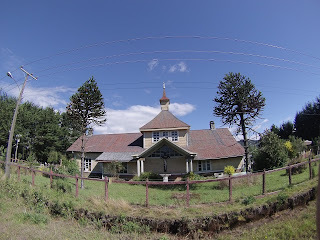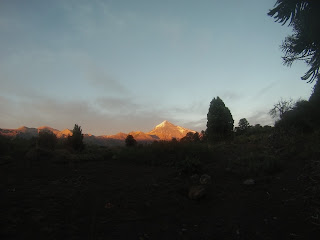I recalled to early January when an old woman asked my for directions to a bus stop. Damn it, what Chilean would ask a foreigner for directions. Of course I gave her directions, and of course my 10 year old camera was lifted with all my pictures from San Martin de los Andes. Gotta keep the hands in the pockets when I talk to old people.
Temuco was very modern town that had many universities. I filled up my MSR bottle with gasoline for 500 pesos ($1). The attendant wanted to know if I planned on drinking the gasoline, but I told him it was for cooking.
I rode to Villarica in the morning. It rained the whole day and the new rain gear worked well. I camped at a campsite on the lake and hid my food and shoes from the dogs. If dogs took my shoes in the South, I might be dead or lose my feet.
From Villarica I rode to Pucon and it was dry and sunny and about 15 degrees and I passed a large snow capped volcano. I stopped by the home of two Americans who worked at a school. There were 6 buildings, all hand built from wood and stone. The children brought fruit to school and cooked their breakfast together and sang together and want on hikes together and then by the time their brains needed science or math or reading, they were ready and thirsted for knowledge. The school overlooked the lake in Pucon.
I said goodbye to Annie and Andy and rode towards the border. About 40km outside of Pucon I began to look for places to camp but most everything was fenced off and I was in Mapuche territory. I stopped by a home with camping signs and talked down the price, as it was low season and there was no one to be seen. The place was beautiful, overlooking an Andean river with beautiful trees. A small, old dog immediately became my friend, and appreciated any scraps I gave him, wasn't aggressive, and didn't go after my food or shoes. During the night, other dogs tried to get at him, but he hid near my tent and I protected him.
Not far from my campsite began the ripio which led up the pass of Mamuil Malal. The Wikipedia entry on the pass is not correct. There is 25km of ripio: 17km leading up to Argentina, and 8km on the Argentinean side. The riding was steep and the ripio consisted in packed mud in places. Strange pine trees appeared. The Lanin volcano appeared and dwarfed all volcanoes I had seen in Chile or Argentina.
I reached the Chilean control. The young men wore casual clothing and had expensive laptops and listened to Chilean rock and one young man watched a movie. I rode 1km to the Argentinean control and the men wore olive drab wool fatigues and the building was spartan. I was asked if I had payed the reciprocity fee, and told the woman the fee only applied at the airport. A casually dressed man, the Western handler, told me everything had changed recently. Now everyone had to pay. Someone should have told me, he said.
I had crossed the border twice already and all I encountered was advice and goodwill. The man was embarrassed, and said he was a cyclist too, and lived in Angostura. He worked 15 day stretches and then returned home down south. He was able to fill out the paperwork online for me and I paid the reciprocity fee and avoided my being sent back to Pucon.
I was tired and 70km from Junin de los Andes and it was 6:30 in the evening. I rode 4km from the control and found a riverside site draped in the strange pine trees and overlooking the massive Lanin volcano. I washed in the cold river and cooked the dried potatoes given to me from the couple at the campsite in Villarica. The stars at night revealed a layer of the galaxy I hadn't seen before.
The final 4 kilometers of ripio the next morning were thick and difficult to ride, yet downhill. In the final kilometer, as I checked the rear spare tires on the back rack, I hit a patch of thick gravel and went down on the left knee. I checked the brake levers, the most vulnerable parts, then the front racks and front panniers, then my knee, bloodied and later bruised.
Next were rolling hills in cool air. I arrived in Junin de los Andes in bright sun. I spent the night in a hostel run by Alvaro, a native of Buenos Aires. At night he left to see his pregnant sister and I held down the fort and assured 4 guests waiting to check in that he would return.
I rode to San Martin de los Andes the next morning, changing into warm socks and the rain suit in the first hour and rode in light rain which subsided when I reached town. I bought media lunas and lunchmeat and ate at a familiar small park in the cold wind. As I was about to leave, a woman brought me café con leche. She said she would have invited me inside but her husband said I was a stranger. I returned the mug to her door across the street and she came out holding a large poodle. As I departed, Jennifer told me “tu siempre estas en mi alma.” Same here, I said.
I ascended in the mountain inhabited by the Mapuche and camped on the shore of Lago Hermoso that night. With cold, gasoline covered hands I attempted to repair the stove pump in the dark, to no avail. A cold dinner and cold coffee the next morning.
At Lago Falkner the next day I rested in a warm almacen on the shore. Huapi park was very open to camping, unlike Lanin park, which was mostly fenced and the territory of the Mapuche. On the way to Villa la Angostura I rode through 30km of ripio and passed many blue lakes. I spent the night in a hostel at Angostura and my two roommates, a couple from Buenos Aires, convinced me I should stay in the mystery of Argentinean Patagonia to Ushuiaia.
To Bariloche, the following day, rolling hills along blue lakes, with a steep climb in strong wind 20km outside the city with a fast descent the final 10. I had crossed in the territory of Rio Negro.I spoke with an old woman, a retired literature professor from Buenos Aires. She cut open about 30 packets of sugar with a razor blade and poured the packets into a plastic bag. She had been to India 4 times and every time she sould describe a political or cultural problem she would grasp a part of her body to which there was a corresponding chakra.
Zoom in on the kilometer signage
Villarica
Warning sign for volcano
School house in Pucon

Just outside the ascent to Mamuil Malal
Volcan Lanin
Climbing Mamuil Malal
Volcan Lanin
Camping on Argentine side of Mamuil Malal
Lanin in the background
Lago Hermoso
Jennifer's cafe con leche
Climbing outside Lago Falkner

Rio Negro province































